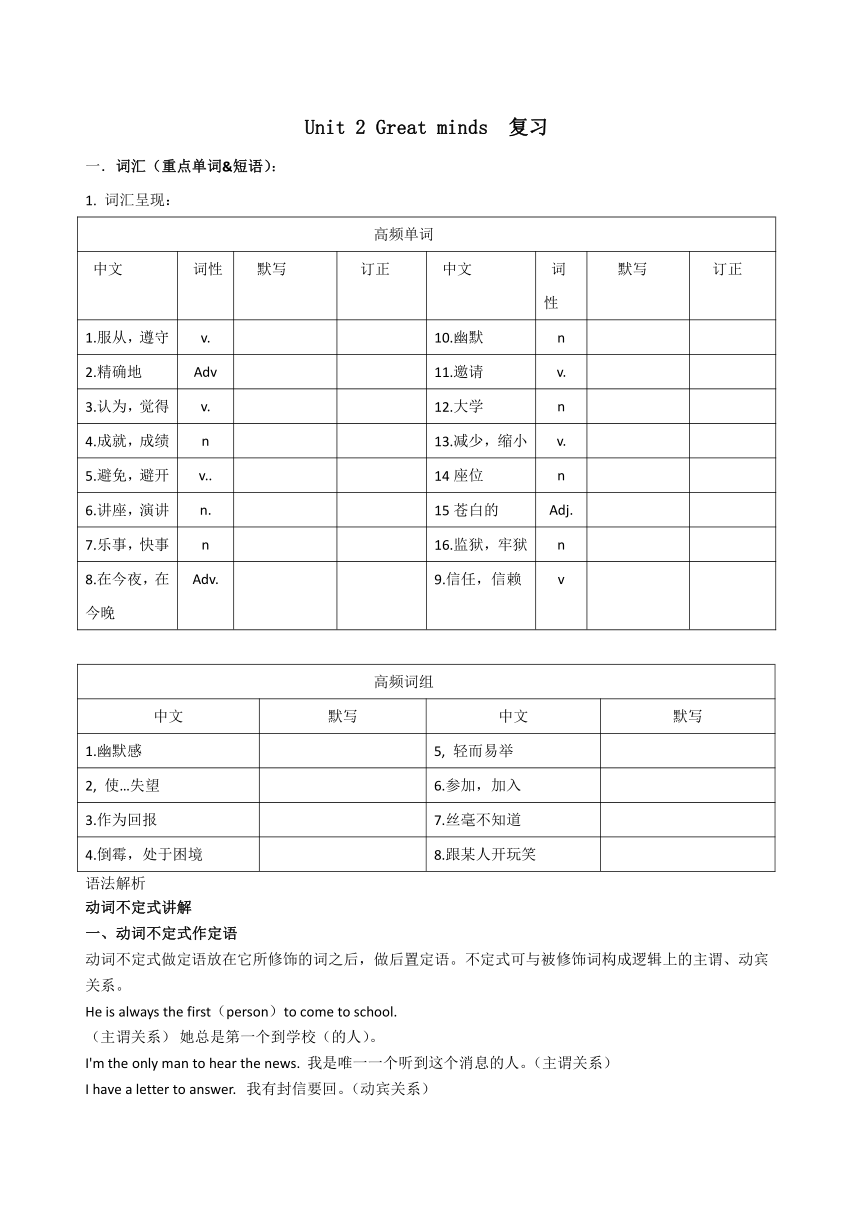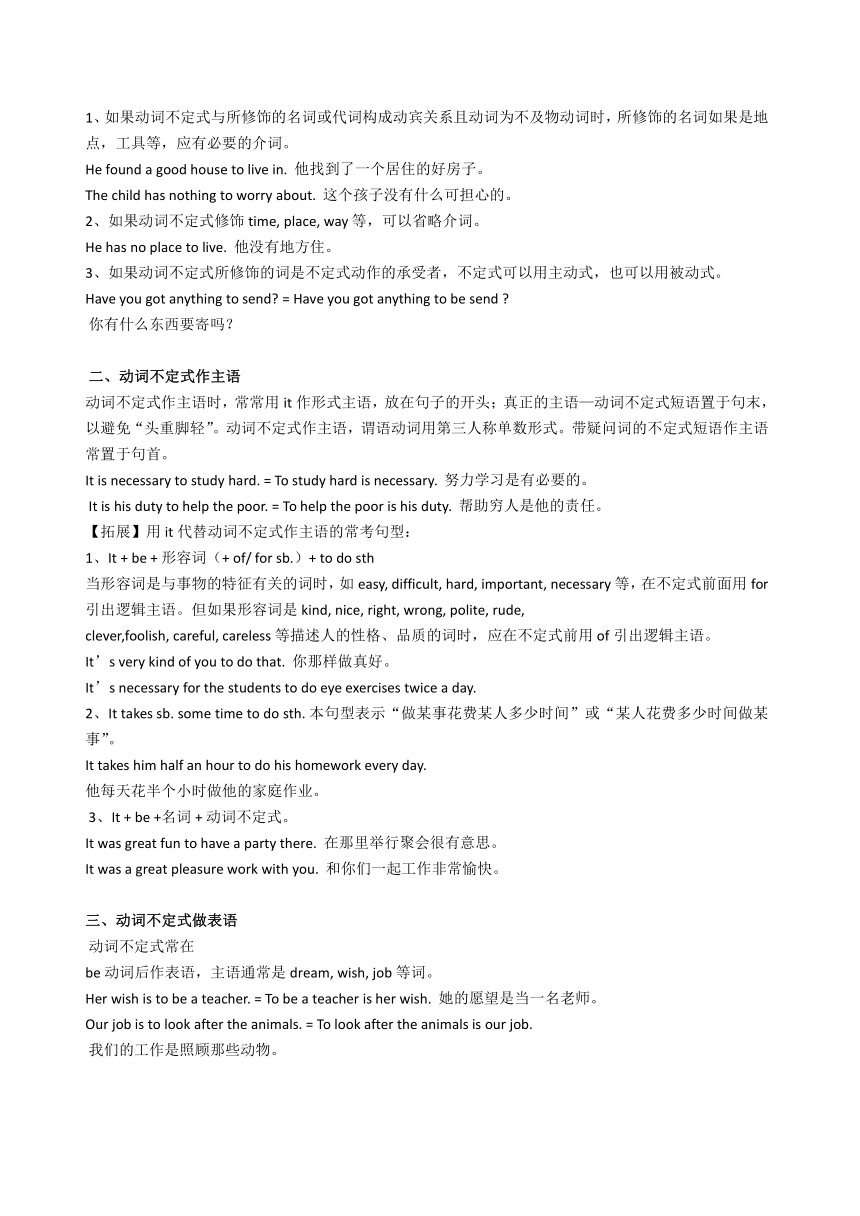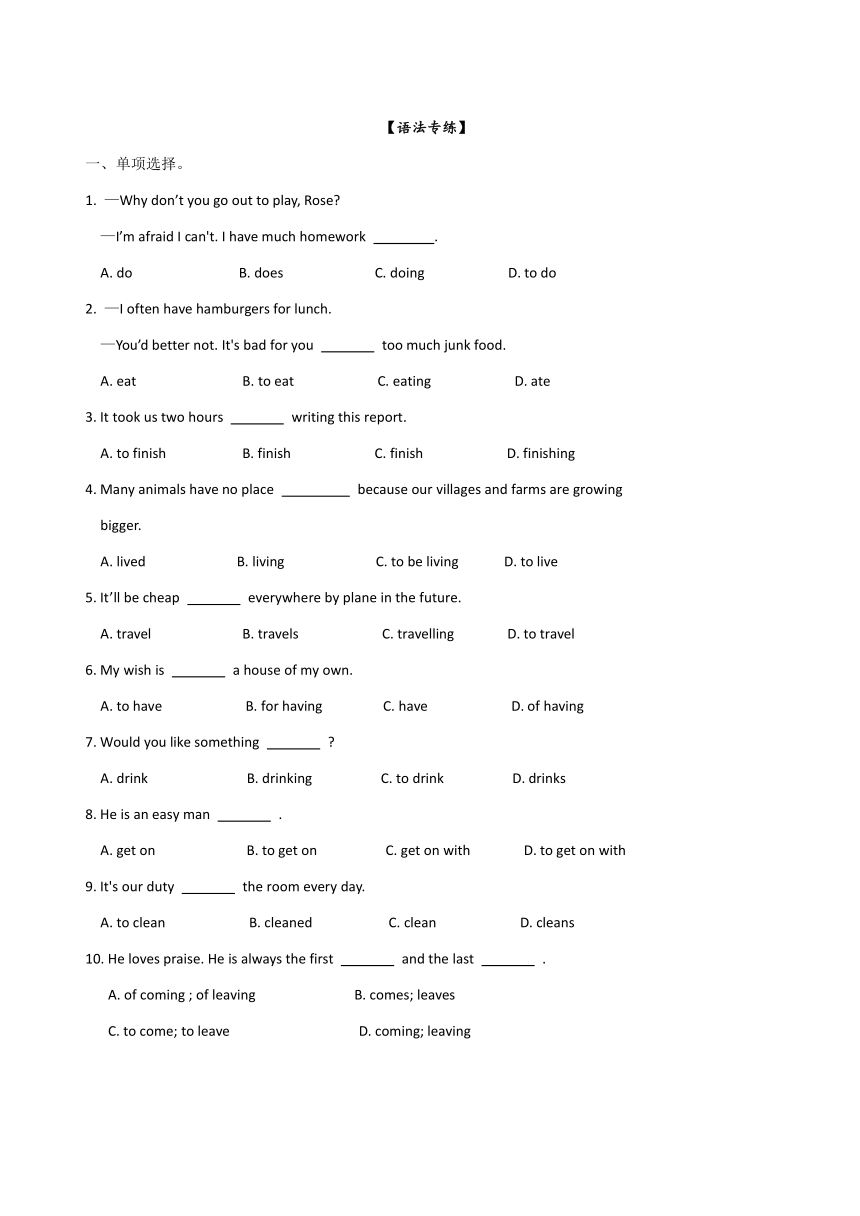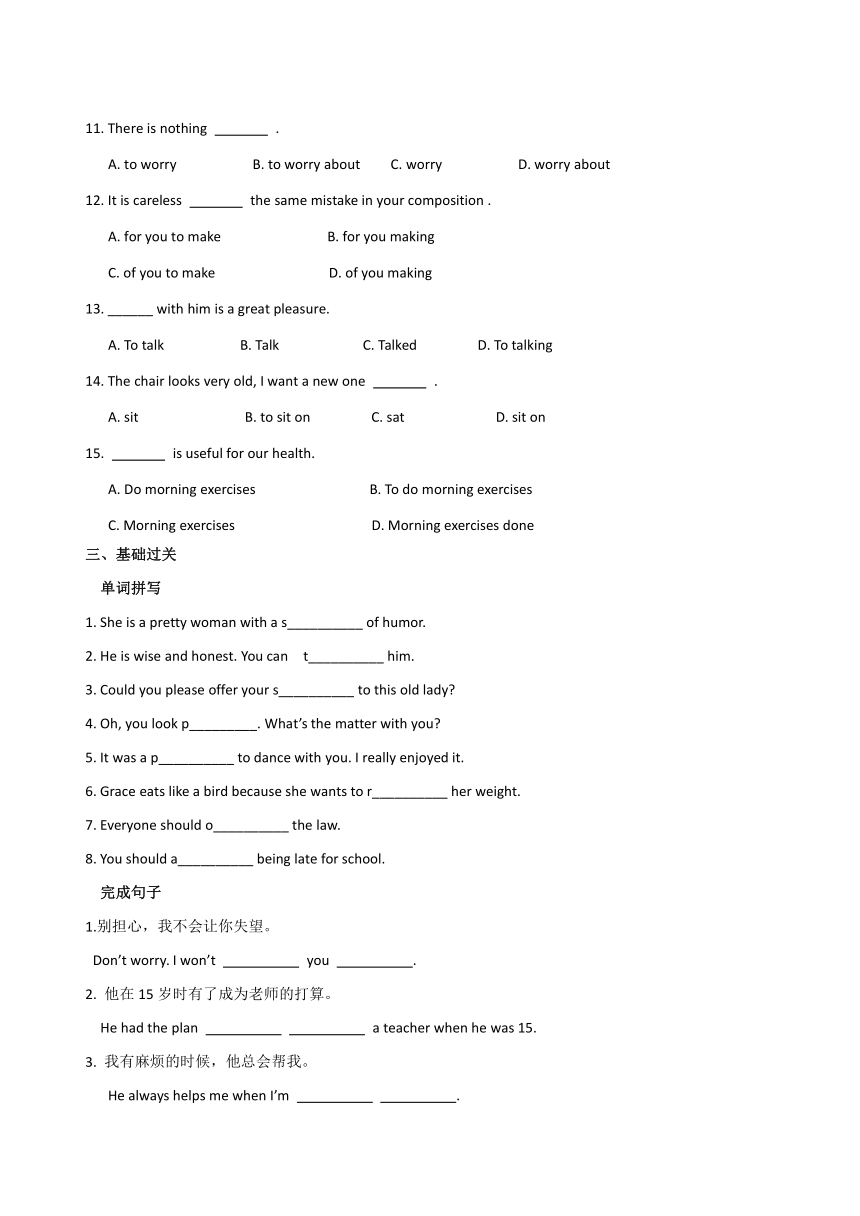Module 1 Geniuses Unit 2 Great minds 复习 (无答案)
文档属性
| 名称 | Module 1 Geniuses Unit 2 Great minds 复习 (无答案) |

|
|
| 格式 | docx | ||
| 文件大小 | 26.2KB | ||
| 资源类型 | 教案 | ||
| 版本资源 | 牛津深圳版 | ||
| 科目 | 英语 | ||
| 更新时间 | 2023-10-04 10:17:53 | ||
图片预览




文档简介
Unit 2 Great minds 复习
词汇(重点单词&短语):
1. 词汇呈现:
高频单词
中文 词性 默写 订正 中文 词性 默写 订正
1.服从,遵守 v. 10.幽默 n
2.精确地 Adv 11.邀请 v.
3.认为,觉得 v. 12.大学 n
4.成就,成绩 n 13.减少,缩小 v.
5.避免,避开 v.. 14座位 n
6.讲座,演讲 n. 15苍白的 Adj.
7.乐事,快事 n 16.监狱,牢狱 n
8.在今夜,在今晚 Adv. 9.信任,信赖 v
高频词组
中文 默写 中文 默写
1.幽默感 5, 轻而易举
2, 使…失望 6.参加,加入
3.作为回报 7.丝毫不知道
4.倒霉,处于困境 8.跟某人开玩笑
语法解析
动词不定式讲解
一、动词不定式作定语
动词不定式做定语放在它所修饰的词之后,做后置定语。不定式可与被修饰词构成逻辑上的主谓、动宾关系。
He is always the first(person)to come to school.
(主谓关系) 她总是第一个到学校(的人)。
I'm the only man to hear the news. 我是唯一一个听到这个消息的人。(主谓关系)
I have a letter to answer. 我有封信要回。(动宾关系)
1、如果动词不定式与所修饰的名词或代词构成动宾关系且动词为不及物动词时,所修饰的名词如果是地点,工具等,应有必要的介词。
He found a good house to live in. 他找到了一个居住的好房子。
The child has nothing to worry about. 这个孩子没有什么可担心的。
2、如果动词不定式修饰time, place, way 等,可以省略介词。
He has no place to live. 他没有地方住。
3、如果动词不定式所修饰的词是不定式动作的承受者,不定式可以用主动式,也可以用被动式。
Have you got anything to send = Have you got anything to be send
你有什么东西要寄吗?
二、动词不定式作主语
动词不定式作主语时,常常用it作形式主语,放在句子的开头;真正的主语—动词不定式短语置于句末,以避免“头重脚轻”。动词不定式作主语,谓语动词用第三人称单数形式。带疑问词的不定式短语作主语常置于句首。
It is necessary to study hard. = To study hard is necessary. 努力学习是有必要的。
It is his duty to help the poor. = To help the poor is his duty. 帮助穷人是他的责任。
【拓展】用it代替动词不定式作主语的常考句型:
1、It + be + 形容词(+ of/ for sb.)+ to do sth
当形容词是与事物的特征有关的词时,如easy, difficult, hard, important, necessary 等,在不定式前面用for引出逻辑主语。但如果形容词是kind, nice, right, wrong, polite, rude,
clever,foolish, careful, careless 等描述人的性格、品质的词时,应在不定式前用 of引出逻辑主语。
It’s very kind of you to do that. 你那样做真好。
It’s necessary for the students to do eye exercises twice a day.
2、It takes sb. some time to do sth. 本句型表示“做某事花费某人多少时间”或“某人花费多少时间做某事”。
It takes him half an hour to do his homework every day.
他每天花半个小时做他的家庭作业。
3、It + be +名词 + 动词不定式。
It was great fun to have a party there. 在那里举行聚会很有意思。
It was a great pleasure work with you. 和你们一起工作非常愉快。
三、动词不定式做表语
动词不定式常在
be 动词后作表语,主语通常是dream, wish, job 等词。
Her wish is to be a teacher. = To be a teacher is her wish. 她的愿望是当一名老师。
Our job is to look after the animals. = To look after the animals is our job.
我们的工作是照顾那些动物。
【语法专练】
一、单项选择。
1. —Why don’t you go out to play, Rose
—I’m afraid I can't. I have much homework .
A. do B. does C. doing D. to do
2. —I often have hamburgers for lunch.
—You’d better not. It's bad for you too much junk food.
A. eat B. to eat C. eating D. ate
3. It took us two hours writing this report.
A. to finish B. finish C. finish D. finishing
4. Many animals have no place because our villages and farms are growing
bigger.
A. lived B. living C. to be living D. to live
5. It’ll be cheap everywhere by plane in the future.
A. travel B. travels C. travelling D. to travel
6. My wish is a house of my own.
A. to have B. for having C. have D. of having
7. Would you like something
A. drink B. drinking C. to drink D. drinks
8. He is an easy man .
A. get on B. to get on C. get on with D. to get on with
9. It's our duty the room every day.
A. to clean B. cleaned C. clean D. cleans
10. He loves praise. He is always the first and the last .
A. of coming ; of leaving B. comes; leaves
C. to come; to leave D. coming; leaving
11. There is nothing .
A. to worry B. to worry about C. worry D. worry about
12. It is careless the same mistake in your composition .
A. for you to make B. for you making
C. of you to make D. of you making
13. ______ with him is a great pleasure.
A. To talk B. Talk C. Talked D. To talking
14. The chair looks very old, I want a new one .
A. sit B. to sit on C. sat D. sit on
15. is useful for our health.
A. Do morning exercises B. To do morning exercises
C. Morning exercises D. Morning exercises done
三、基础过关
单词拼写
1. She is a pretty woman with a s__________ of humor.
2. He is wise and honest. You can t__________ him.
3. Could you please offer your s__________ to this old lady
4. Oh, you look p_________. What’s the matter with you
5. It was a p__________ to dance with you. I really enjoyed it.
6. Grace eats like a bird because she wants to r__________ her weight.
7. Everyone should o__________ the law.
8. You should a__________ being late for school.
完成句子
1.别担心,我不会让你失望。
Don’t worry. I won’t you .
2. 他在15岁时有了成为老师的打算。
He had the plan a teacher when he was 15.
3. 我有麻烦的时候,他总会帮我。
He always helps me when I’m .
4. 你想参加运动会吗?
Do you want to the sports meet
5. 我们同时看到了这只猫。
We saw the cat .
6. 他们沿着街道并排走着。
They were walking along the street .
7. 你应该诚实对待自己。
You should yourself.
8. 我们送了他一份礼物回报他的好意.
We give him a gift for his kindness.
9. 他是第一个教我音乐的人.
He was the first person me music.
10. 我不知道怎样去动物园。
I don’t know ________ _________ _______ __________ the zoo.
四.语法内容(动词不定式作定语,主语,表语):
1. 完成句子:
1, 对一个13岁的男孩来说,独自去外国旅游真的是很勇敢。
________ brave ________ a 13-year-old boy ________ ________ around the foreign countries alone.
2, 对孩子们来说,穿过繁忙的街道很危险。
It’s very _____________ ____________children to cross the busy street.
3, 老师告诉Sally即使是没有时间也不要放弃弹钢琴.
The teacher told Sally playing the piano even though she had no time
4. 我知道如何使用电脑。
I know __________ __________ ____________ a computer.
5. 警察叫那些孩子不要在马路上玩耍。
The police told the children __________ _______ ________ on the road.
6.重要的是要准时赶到那儿。
The important thing is_______ _________there on time.
7.参观广州博物馆对我们很有教育意义。
______ _______ very educational for us _______ ________ Guangzhou Museum.
课后作业
一. 单项选择:
1 He’s a nice person ______.
A. to work with B. working with C. worked D. works
2 The sofa is very comfortable to ______.
A. sit B. sit on C. be sat D. be sitting
3 In my family, my mother is the last one _______.
A. goes to bed B. going to bed C. go to bed D. to go to bed
4 — Mum, can I have something _______
— Oh, dear. You can only drink some water. There is in the kitchen.
A. to drink; nothing else B. drinking; something else
C. to eat; something else D. eating; nothing else
5. It took them three days _______ the lost bag.
A. find B. finding C. found D. to find
6 It’s a good habit ______ a walk after dinner.
A. to come B. to be C. to take D. to go
7 Some children are talking about what TV programmes ______.
A. watching B. for watching C. to watch D. will watch
8 My sister’s wish is ______ a famous singer.
A. be B. to be C. become D. becomes
9 We need to buy lots of things. _______ money now seems impossible.
A. Save B. Saves C. Saved D. To save
10 It’s stupid ______ you to make such a mistake.
A. for B. of C. to D. with
二,综合训练
1、语法选择
One’s attitude is always important. If you are lazy and weak, you will never taste any success. But if you are hardworking, success and happiness will be more likely to come to you.
I love eating persimmons(柿子). But you cant get them until autumn. If you try them before the right time, they probably 1__bad.
In Grade 9, because of my poor grades, my parents were worried that I wouldn't be able to get into _ 2 _excellent high school. They pushed me to study hard, but I didn’t really understand 3 they were so anxious. Summer came. and I studied even 4 . The hot weather made me 5 sleepy and I couldn't focus on my textbooks. But every time I wanted to stop 6 , Mom would shout, "Hey you! Think about your future, if you don’t work hard, you'll regret it! "I had to sit back down again and return to my textbooks 7 were full of words. But all I 8 about was playing with my friends and eating persimmons.
My mom would say to me, 9 a serious look on her face, "you 10 get any fruit in autumn unless a persimmon tree grow in summer! Only by hard work can you get the good result of your work.”
Although I didn’t understand it at that time, I gradually came to see the truth of her words. A few months later, I 11 got into the key high school. It was autumn.
Walking in my new school, I could see quite a few persimmon trees. It was 12 a red fruit that it looked as if it was on fire. Suddenly, I realized that working hard may be bitter but 13 fruit is sweet.
My mom was right, if a persimmon tree doesn't grow during summer, it can't bear fruit in autumn. I smiled. I had grown through the summer 14 now it was autumn. The fruits of my labors could 15 _by me now!
1.A. taste B. tasted C. taste D. have tasted
2.A.a B. an C. the D./
3. A. what B. if C why D. that
4. A harder B. hardly C. hard D .more hardly
5. A. feeling B. to feel C. felt D. feel
6. A to work B working C work D. worked
7. A whose B where C what D. which
8. A think B thought C thinking D. to think
9 A. with B. to C. about D.in
10. A. mustn’ t B. needn't C. won't D. shouldn't
11. A. success B. succeed C. successful D. successfully
12. A. very B. such C. so D. too
13. A. his B. her C. its D. their
14.A.but B. however C. or D. and
15. A. be enjoyed B. enjoy C. enjoying D. enjoyed
三. 完形填空:
Young people are often unhappy when they are with their parents. They 16 that their parents don't understand them. They often think their parents are too strict with them, and they are never given a 17 hand.
Parents often find it 18 to win their children's trust and they seem to forget how they themselves felt when they were young. For example, young people like to do things without much thinking. It's probably one of their ways to 19 that they have grown up and they can deal with any difficult things. Older people worry more easily. Most of them plan things ahead and don't like their plans to be 20 .
Young people often make their parents angry by clothes they want, the music they enjoy and something else. 21 , they don't want to cause any trouble. They just feel that 22 this way, they can be cut off from the old people's world and want to make a new culture of their own. And 23 their parents don't like their music, clothes or their manner of speech, the young people will feel very happy.
If you plan to control your 24 , you'd better win your parents over and try to get them to understand you. If your parents see that you have high sense of responsibility (责任感), they will certainly give you the right to do 25 you want to do.
16. A. remember B. hope C. say D. know
17. A. careful B. useful C. free D. strong
18. A. happy B. different C. easy D. difficult
19. A. learn B. see C. find D. show
20. A. changed B. worked C. liked D. needed
21. A. Certainly B. Nearly C. Actually D. Obviously
22. A. for B. across C. at D. in
23. A. if B. but C. or D. because
24. A. life B. work C. study D. health
25. A. how B. what C. when D. where
词汇(重点单词&短语):
1. 词汇呈现:
高频单词
中文 词性 默写 订正 中文 词性 默写 订正
1.服从,遵守 v. 10.幽默 n
2.精确地 Adv 11.邀请 v.
3.认为,觉得 v. 12.大学 n
4.成就,成绩 n 13.减少,缩小 v.
5.避免,避开 v.. 14座位 n
6.讲座,演讲 n. 15苍白的 Adj.
7.乐事,快事 n 16.监狱,牢狱 n
8.在今夜,在今晚 Adv. 9.信任,信赖 v
高频词组
中文 默写 中文 默写
1.幽默感 5, 轻而易举
2, 使…失望 6.参加,加入
3.作为回报 7.丝毫不知道
4.倒霉,处于困境 8.跟某人开玩笑
语法解析
动词不定式讲解
一、动词不定式作定语
动词不定式做定语放在它所修饰的词之后,做后置定语。不定式可与被修饰词构成逻辑上的主谓、动宾关系。
He is always the first(person)to come to school.
(主谓关系) 她总是第一个到学校(的人)。
I'm the only man to hear the news. 我是唯一一个听到这个消息的人。(主谓关系)
I have a letter to answer. 我有封信要回。(动宾关系)
1、如果动词不定式与所修饰的名词或代词构成动宾关系且动词为不及物动词时,所修饰的名词如果是地点,工具等,应有必要的介词。
He found a good house to live in. 他找到了一个居住的好房子。
The child has nothing to worry about. 这个孩子没有什么可担心的。
2、如果动词不定式修饰time, place, way 等,可以省略介词。
He has no place to live. 他没有地方住。
3、如果动词不定式所修饰的词是不定式动作的承受者,不定式可以用主动式,也可以用被动式。
Have you got anything to send = Have you got anything to be send
你有什么东西要寄吗?
二、动词不定式作主语
动词不定式作主语时,常常用it作形式主语,放在句子的开头;真正的主语—动词不定式短语置于句末,以避免“头重脚轻”。动词不定式作主语,谓语动词用第三人称单数形式。带疑问词的不定式短语作主语常置于句首。
It is necessary to study hard. = To study hard is necessary. 努力学习是有必要的。
It is his duty to help the poor. = To help the poor is his duty. 帮助穷人是他的责任。
【拓展】用it代替动词不定式作主语的常考句型:
1、It + be + 形容词(+ of/ for sb.)+ to do sth
当形容词是与事物的特征有关的词时,如easy, difficult, hard, important, necessary 等,在不定式前面用for引出逻辑主语。但如果形容词是kind, nice, right, wrong, polite, rude,
clever,foolish, careful, careless 等描述人的性格、品质的词时,应在不定式前用 of引出逻辑主语。
It’s very kind of you to do that. 你那样做真好。
It’s necessary for the students to do eye exercises twice a day.
2、It takes sb. some time to do sth. 本句型表示“做某事花费某人多少时间”或“某人花费多少时间做某事”。
It takes him half an hour to do his homework every day.
他每天花半个小时做他的家庭作业。
3、It + be +名词 + 动词不定式。
It was great fun to have a party there. 在那里举行聚会很有意思。
It was a great pleasure work with you. 和你们一起工作非常愉快。
三、动词不定式做表语
动词不定式常在
be 动词后作表语,主语通常是dream, wish, job 等词。
Her wish is to be a teacher. = To be a teacher is her wish. 她的愿望是当一名老师。
Our job is to look after the animals. = To look after the animals is our job.
我们的工作是照顾那些动物。
【语法专练】
一、单项选择。
1. —Why don’t you go out to play, Rose
—I’m afraid I can't. I have much homework .
A. do B. does C. doing D. to do
2. —I often have hamburgers for lunch.
—You’d better not. It's bad for you too much junk food.
A. eat B. to eat C. eating D. ate
3. It took us two hours writing this report.
A. to finish B. finish C. finish D. finishing
4. Many animals have no place because our villages and farms are growing
bigger.
A. lived B. living C. to be living D. to live
5. It’ll be cheap everywhere by plane in the future.
A. travel B. travels C. travelling D. to travel
6. My wish is a house of my own.
A. to have B. for having C. have D. of having
7. Would you like something
A. drink B. drinking C. to drink D. drinks
8. He is an easy man .
A. get on B. to get on C. get on with D. to get on with
9. It's our duty the room every day.
A. to clean B. cleaned C. clean D. cleans
10. He loves praise. He is always the first and the last .
A. of coming ; of leaving B. comes; leaves
C. to come; to leave D. coming; leaving
11. There is nothing .
A. to worry B. to worry about C. worry D. worry about
12. It is careless the same mistake in your composition .
A. for you to make B. for you making
C. of you to make D. of you making
13. ______ with him is a great pleasure.
A. To talk B. Talk C. Talked D. To talking
14. The chair looks very old, I want a new one .
A. sit B. to sit on C. sat D. sit on
15. is useful for our health.
A. Do morning exercises B. To do morning exercises
C. Morning exercises D. Morning exercises done
三、基础过关
单词拼写
1. She is a pretty woman with a s__________ of humor.
2. He is wise and honest. You can t__________ him.
3. Could you please offer your s__________ to this old lady
4. Oh, you look p_________. What’s the matter with you
5. It was a p__________ to dance with you. I really enjoyed it.
6. Grace eats like a bird because she wants to r__________ her weight.
7. Everyone should o__________ the law.
8. You should a__________ being late for school.
完成句子
1.别担心,我不会让你失望。
Don’t worry. I won’t you .
2. 他在15岁时有了成为老师的打算。
He had the plan a teacher when he was 15.
3. 我有麻烦的时候,他总会帮我。
He always helps me when I’m .
4. 你想参加运动会吗?
Do you want to the sports meet
5. 我们同时看到了这只猫。
We saw the cat .
6. 他们沿着街道并排走着。
They were walking along the street .
7. 你应该诚实对待自己。
You should yourself.
8. 我们送了他一份礼物回报他的好意.
We give him a gift for his kindness.
9. 他是第一个教我音乐的人.
He was the first person me music.
10. 我不知道怎样去动物园。
I don’t know ________ _________ _______ __________ the zoo.
四.语法内容(动词不定式作定语,主语,表语):
1. 完成句子:
1, 对一个13岁的男孩来说,独自去外国旅游真的是很勇敢。
________ brave ________ a 13-year-old boy ________ ________ around the foreign countries alone.
2, 对孩子们来说,穿过繁忙的街道很危险。
It’s very _____________ ____________children to cross the busy street.
3, 老师告诉Sally即使是没有时间也不要放弃弹钢琴.
The teacher told Sally playing the piano even though she had no time
4. 我知道如何使用电脑。
I know __________ __________ ____________ a computer.
5. 警察叫那些孩子不要在马路上玩耍。
The police told the children __________ _______ ________ on the road.
6.重要的是要准时赶到那儿。
The important thing is_______ _________there on time.
7.参观广州博物馆对我们很有教育意义。
______ _______ very educational for us _______ ________ Guangzhou Museum.
课后作业
一. 单项选择:
1 He’s a nice person ______.
A. to work with B. working with C. worked D. works
2 The sofa is very comfortable to ______.
A. sit B. sit on C. be sat D. be sitting
3 In my family, my mother is the last one _______.
A. goes to bed B. going to bed C. go to bed D. to go to bed
4 — Mum, can I have something _______
— Oh, dear. You can only drink some water. There is in the kitchen.
A. to drink; nothing else B. drinking; something else
C. to eat; something else D. eating; nothing else
5. It took them three days _______ the lost bag.
A. find B. finding C. found D. to find
6 It’s a good habit ______ a walk after dinner.
A. to come B. to be C. to take D. to go
7 Some children are talking about what TV programmes ______.
A. watching B. for watching C. to watch D. will watch
8 My sister’s wish is ______ a famous singer.
A. be B. to be C. become D. becomes
9 We need to buy lots of things. _______ money now seems impossible.
A. Save B. Saves C. Saved D. To save
10 It’s stupid ______ you to make such a mistake.
A. for B. of C. to D. with
二,综合训练
1、语法选择
One’s attitude is always important. If you are lazy and weak, you will never taste any success. But if you are hardworking, success and happiness will be more likely to come to you.
I love eating persimmons(柿子). But you cant get them until autumn. If you try them before the right time, they probably 1__bad.
In Grade 9, because of my poor grades, my parents were worried that I wouldn't be able to get into _ 2 _excellent high school. They pushed me to study hard, but I didn’t really understand 3 they were so anxious. Summer came. and I studied even 4 . The hot weather made me 5 sleepy and I couldn't focus on my textbooks. But every time I wanted to stop 6 , Mom would shout, "Hey you! Think about your future, if you don’t work hard, you'll regret it! "I had to sit back down again and return to my textbooks 7 were full of words. But all I 8 about was playing with my friends and eating persimmons.
My mom would say to me, 9 a serious look on her face, "you 10 get any fruit in autumn unless a persimmon tree grow in summer! Only by hard work can you get the good result of your work.”
Although I didn’t understand it at that time, I gradually came to see the truth of her words. A few months later, I 11 got into the key high school. It was autumn.
Walking in my new school, I could see quite a few persimmon trees. It was 12 a red fruit that it looked as if it was on fire. Suddenly, I realized that working hard may be bitter but 13 fruit is sweet.
My mom was right, if a persimmon tree doesn't grow during summer, it can't bear fruit in autumn. I smiled. I had grown through the summer 14 now it was autumn. The fruits of my labors could 15 _by me now!
1.A. taste B. tasted C. taste D. have tasted
2.A.a B. an C. the D./
3. A. what B. if C why D. that
4. A harder B. hardly C. hard D .more hardly
5. A. feeling B. to feel C. felt D. feel
6. A to work B working C work D. worked
7. A whose B where C what D. which
8. A think B thought C thinking D. to think
9 A. with B. to C. about D.in
10. A. mustn’ t B. needn't C. won't D. shouldn't
11. A. success B. succeed C. successful D. successfully
12. A. very B. such C. so D. too
13. A. his B. her C. its D. their
14.A.but B. however C. or D. and
15. A. be enjoyed B. enjoy C. enjoying D. enjoyed
三. 完形填空:
Young people are often unhappy when they are with their parents. They 16 that their parents don't understand them. They often think their parents are too strict with them, and they are never given a 17 hand.
Parents often find it 18 to win their children's trust and they seem to forget how they themselves felt when they were young. For example, young people like to do things without much thinking. It's probably one of their ways to 19 that they have grown up and they can deal with any difficult things. Older people worry more easily. Most of them plan things ahead and don't like their plans to be 20 .
Young people often make their parents angry by clothes they want, the music they enjoy and something else. 21 , they don't want to cause any trouble. They just feel that 22 this way, they can be cut off from the old people's world and want to make a new culture of their own. And 23 their parents don't like their music, clothes or their manner of speech, the young people will feel very happy.
If you plan to control your 24 , you'd better win your parents over and try to get them to understand you. If your parents see that you have high sense of responsibility (责任感), they will certainly give you the right to do 25 you want to do.
16. A. remember B. hope C. say D. know
17. A. careful B. useful C. free D. strong
18. A. happy B. different C. easy D. difficult
19. A. learn B. see C. find D. show
20. A. changed B. worked C. liked D. needed
21. A. Certainly B. Nearly C. Actually D. Obviously
22. A. for B. across C. at D. in
23. A. if B. but C. or D. because
24. A. life B. work C. study D. health
25. A. how B. what C. when D. where
